-
 Bitcoin
Bitcoin $83,733.4061
-1.29% -
 Ethereum
Ethereum $1,594.3479
-1.74% -
 Tether USDt
Tether USDt $1.0000
0.01% -
 XRP
XRP $2.0826
-1.94% -
 BNB
BNB $581.9915
-0.41% -
 Solana
Solana $126.1154
-2.12% -
 USDC
USDC $0.9999
-0.01% -
 TRON
TRON $0.2513
0.07% -
 Dogecoin
Dogecoin $0.1553
-2.14% -
 Cardano
Cardano $0.6128
-3.26% -
 UNUS SED LEO
UNUS SED LEO $9.3174
-1.22% -
 Chainlink
Chainlink $12.3521
-1.81% -
 Avalanche
Avalanche $18.8671
-5.22% -
 Stellar
Stellar $0.2363
-1.27% -
 Toncoin
Toncoin $2.9018
0.31% -
 Shiba Inu
Shiba Inu $0.0...01172
-0.86% -
 Sui
Sui $2.0951
-3.63% -
 Hedera
Hedera $0.1580
-4.98% -
 Bitcoin Cash
Bitcoin Cash $319.4231
-0.81% -
 Litecoin
Litecoin $76.0657
-1.99% -
 Polkadot
Polkadot $3.5459
-2.73% -
 Dai
Dai $1.0000
0.01% -
 Bitget Token
Bitget Token $4.2560
-1.12% -
 Hyperliquid
Hyperliquid $15.2255
-5.33% -
 Ethena USDe
Ethena USDe $0.9992
0.01% -
 Pi
Pi $0.6236
-15.50% -
 Monero
Monero $216.8844
2.23% -
 Uniswap
Uniswap $5.2307
-1.66% -
 OKB
OKB $52.1135
1.06% -
 Pepe
Pepe $0.0...07120
-2.00%
Is cloud mining worth investing in?
Cloud mining offers accessibility and reduced costs but comes with risks like scams and profitability concerns; thorough research is essential before investing.
Apr 10, 2025 at 08:28 pm
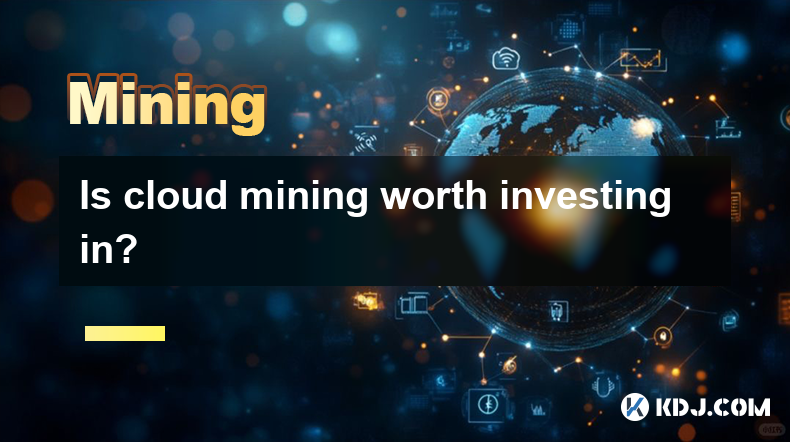
Is cloud mining worth investing in? This question has been on the minds of many cryptocurrency enthusiasts looking to enter the mining space without the need for expensive hardware and technical know-how. Cloud mining allows individuals to rent computing power from remote data centers to mine cryptocurrencies. In this article, we will delve into the pros and cons of cloud mining, its profitability, and the risks involved to help you determine if it is a worthwhile investment.
Understanding Cloud Mining
Cloud mining is a process where individuals can mine cryptocurrencies without the need to purchase and maintain their own mining hardware. Instead, they rent computing power from a cloud mining provider. This service allows users to participate in the mining process by paying a fee, usually on a daily, weekly, or monthly basis.
The concept of cloud mining emerged as a solution to the high entry barriers of traditional mining, such as the cost of hardware, electricity, and the technical knowledge required to set up and maintain mining rigs. By outsourcing the mining process, users can potentially earn cryptocurrencies without the upfront investment and ongoing maintenance costs.
Pros of Cloud Mining
One of the primary advantages of cloud mining is accessibility. Anyone with an internet connection can participate in cloud mining, making it an attractive option for those who do not have the technical skills or financial resources to set up their own mining operation.
Another benefit is reduced operational costs. Traditional mining requires significant investment in hardware, electricity, and cooling systems. With cloud mining, these costs are borne by the service provider, allowing users to focus solely on the mining process.
Flexibility is also a key advantage. Cloud mining contracts often come with various durations and hash power options, allowing users to tailor their investment to their financial goals and risk tolerance. This flexibility can be particularly appealing to those looking to experiment with mining without committing to a long-term investment.
Cons of Cloud Mining
Despite its advantages, cloud mining also comes with several drawbacks. One of the most significant concerns is profitability. The profitability of cloud mining depends on several factors, including the price of the cryptocurrency being mined, the cost of the mining contract, and the efficiency of the mining hardware used by the provider. In some cases, the fees charged by the provider may outweigh the earnings from mining, resulting in a net loss for the user.
Another major concern is reliability and trustworthiness. The cloud mining industry has been plagued by scams and fraudulent schemes, where providers disappear with users' investments. It is crucial to thoroughly research and vet any cloud mining provider before investing to minimize the risk of falling victim to a scam.
Lack of control is another disadvantage. When using a cloud mining service, users have no control over the mining hardware or the mining process itself. This lack of control can be frustrating for those who prefer to have a hands-on approach to their investments.
Assessing Profitability
To determine if cloud mining is worth investing in, it is essential to assess its profitability. This involves calculating the potential earnings from mining against the costs of the mining contract and any associated fees.
- Calculate potential earnings: Use a mining calculator to estimate the amount of cryptocurrency you can mine based on the hash power you are renting and the current difficulty level of the network.
- Subtract costs: Deduct the cost of the mining contract and any other fees from your potential earnings to determine your net profit.
- Consider market volatility: Keep in mind that the price of cryptocurrencies can be highly volatile, which can significantly impact the profitability of your mining operation.
By carefully analyzing these factors, you can make a more informed decision about whether cloud mining is a profitable investment for you.
Risks and Considerations
Investing in cloud mining comes with several risks that should be carefully considered. Scams and fraud are prevalent in the industry, and it is crucial to research and choose a reputable provider to minimize this risk.
Contract terms and conditions should also be thoroughly reviewed. Some providers may have hidden fees or clauses that can impact your profitability. Make sure you understand the terms of the contract before committing to a cloud mining investment.
Market volatility is another significant risk. The price of cryptocurrencies can fluctuate dramatically, which can affect the profitability of your mining operation. It is important to be prepared for potential losses and to only invest what you can afford to lose.
Choosing a Cloud Mining Provider
Selecting a reputable cloud mining provider is crucial to the success of your investment. Here are some steps to help you choose a reliable provider:
- Research the provider: Look for reviews and testimonials from other users to gauge the provider's reputation. Check if the provider is registered and regulated by any financial authorities.
- Evaluate the contract terms: Carefully read the terms and conditions of the mining contract. Look for any hidden fees or clauses that may impact your profitability.
- Assess the provider's infrastructure: Ensure that the provider has a robust and reliable infrastructure to support your mining operations. Check if they use up-to-date and efficient mining hardware.
- Consider customer support: A good cloud mining provider should offer responsive and helpful customer support to address any issues or concerns you may have.
By following these steps, you can increase your chances of choosing a reliable and trustworthy cloud mining provider.
Frequently Asked Questions
Q: Can I mine multiple cryptocurrencies with cloud mining?
A: Yes, many cloud mining providers offer contracts for mining various cryptocurrencies, including Bitcoin, Ethereum, and others. Be sure to check the specific offerings of the provider you are considering.
Q: How long does it take to start earning from cloud mining?
A: The time it takes to start earning from cloud mining can vary depending on the provider and the cryptocurrency being mined. Some providers may have a waiting period before you can start mining, while others may allow you to start immediately after purchasing a contract.
Q: Is it possible to cancel a cloud mining contract?
A: The ability to cancel a cloud mining contract depends on the terms and conditions set by the provider. Some providers may allow you to cancel your contract and receive a refund, while others may have strict no-refund policies. Always review the contract terms before investing.
Q: Can cloud mining be profitable in the long term?
A: The long-term profitability of cloud mining depends on various factors, including the price of the cryptocurrency being mined, the efficiency of the mining hardware, and the fees charged by the provider. It is important to continuously monitor and adjust your mining strategy to maximize profitability.
Disclaimer:info@kdj.com
The information provided is not trading advice. kdj.com does not assume any responsibility for any investments made based on the information provided in this article. Cryptocurrencies are highly volatile and it is highly recommended that you invest with caution after thorough research!
If you believe that the content used on this website infringes your copyright, please contact us immediately (info@kdj.com) and we will delete it promptly.
- Semler Scientific (SMLR) Agrees to Pay $29.75M to Settle DOJ Probe into QuantaFlo Marketing
- 2025-04-16 11:15:19
- 2025 California commercial salmon fishing season closed for a third year running due to dwindling fish numbers
- 2025-04-16 11:15:19
- Dogecoin (DOGE) Eyes $0.21 as Bulls Hold the Line
- 2025-04-16 11:10:13
- Despite Its Recent Rally, XRP Faces an Upward Barrier. A New Contender Is Making Waves
- 2025-04-16 11:10:13
- Bitcoin (BTC) Demonstrates Strength and Resilience as the Dollar Index (DXY) Continues Its Losing Streak
- 2025-04-16 11:05:13
- Within the fast-growing AI ecosystem, social activity is now a key indicator
- 2025-04-16 11:05:13
Related knowledge
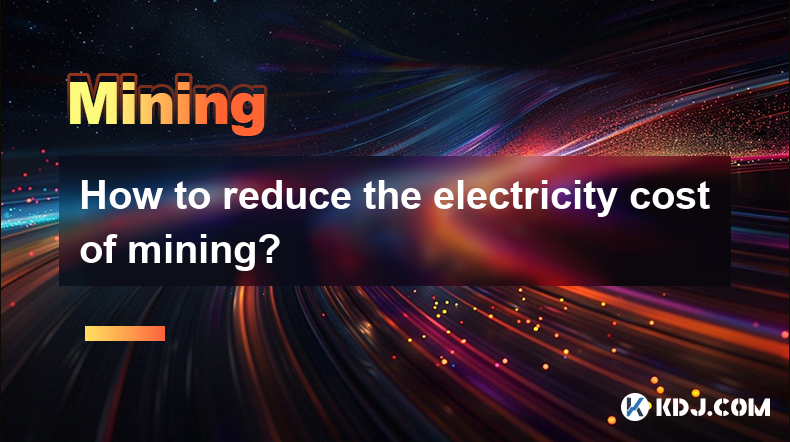
How to reduce the electricity cost of mining?
Apr 16,2025 at 08:42am
Mining cryptocurrencies, particularly Bitcoin, is an energy-intensive process that can lead to significant electricity costs. However, there are several strategies that miners can employ to reduce these expenses and make their operations more cost-effective. In this article, we will explore various methods to minimize the electricity cost of mining. Cho...
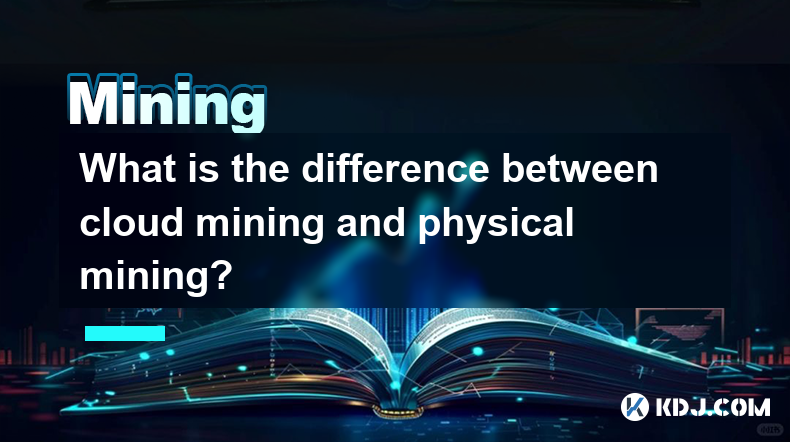
What is the difference between cloud mining and physical mining?
Apr 16,2025 at 01:49am
What is the difference between cloud mining and physical mining? In the world of cryptocurrencies, mining is the process by which new coins are generated and transactions are verified and added to the blockchain. There are two primary methods of mining: cloud mining and physical mining. Understanding the differences between these two approaches can help...
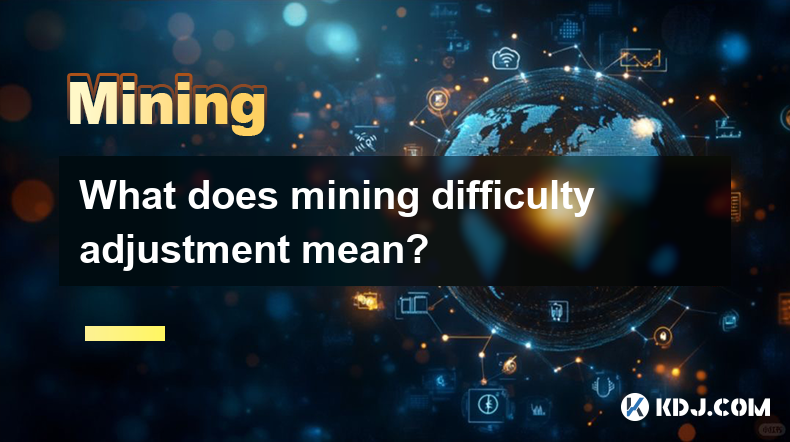
What does mining difficulty adjustment mean?
Apr 16,2025 at 12:42am
What does mining difficulty adjustment mean? Mining difficulty adjustment is a crucial mechanism in blockchain networks, particularly in Proof of Work (PoW) systems like Bitcoin. It ensures that the rate at which new blocks are added to the blockchain remains consistent, despite fluctuations in the total computational power (hash rate) of the network. T...
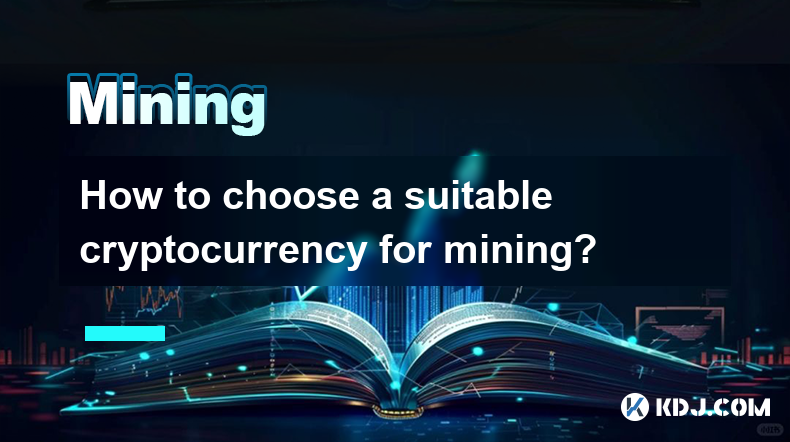
How to choose a suitable cryptocurrency for mining?
Apr 16,2025 at 10:15am
Choosing a suitable cryptocurrency for mining involves several considerations that can impact your profitability and efficiency. Mining cryptocurrencies can be a rewarding venture, but it requires careful planning and research. In this article, we will explore the key factors to consider when selecting a cryptocurrency for mining, ensuring you make an i...
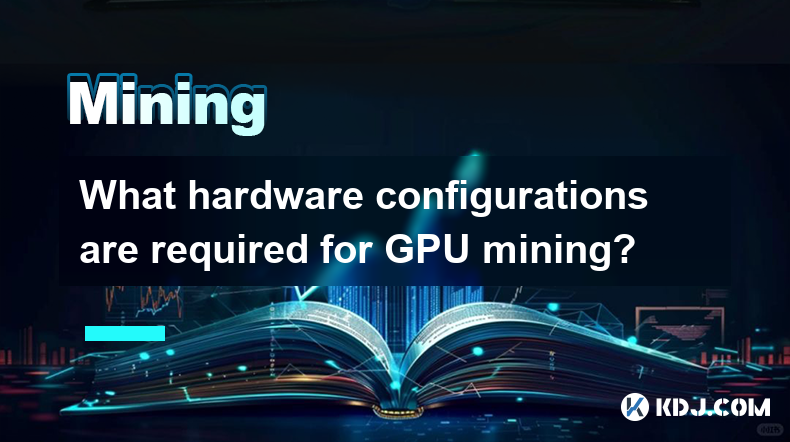
What hardware configurations are required for GPU mining?
Apr 16,2025 at 09:21am
GPU mining has become a popular method for cryptocurrency enthusiasts to mine various cryptocurrencies, such as Ethereum, Ravencoin, and others. To successfully engage in GPU mining, it is essential to understand the hardware configurations required to maximize efficiency and profitability. This article will delve into the specifics of what you need to ...
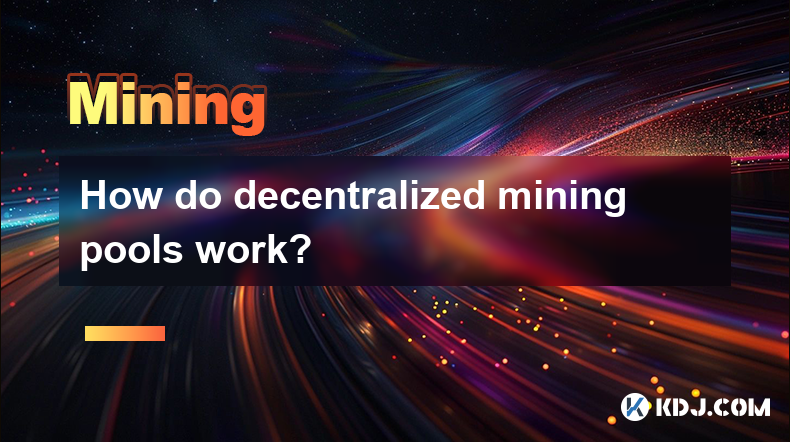
How do decentralized mining pools work?
Apr 16,2025 at 05:42am
Decentralized mining pools represent a significant evolution in the world of cryptocurrency mining, offering a more democratic and transparent approach compared to traditional centralized pools. In this article, we will explore the mechanics of decentralized mining pools, their benefits, and how they operate within the cryptocurrency ecosystem. What are...

How to reduce the electricity cost of mining?
Apr 16,2025 at 08:42am
Mining cryptocurrencies, particularly Bitcoin, is an energy-intensive process that can lead to significant electricity costs. However, there are several strategies that miners can employ to reduce these expenses and make their operations more cost-effective. In this article, we will explore various methods to minimize the electricity cost of mining. Cho...

What is the difference between cloud mining and physical mining?
Apr 16,2025 at 01:49am
What is the difference between cloud mining and physical mining? In the world of cryptocurrencies, mining is the process by which new coins are generated and transactions are verified and added to the blockchain. There are two primary methods of mining: cloud mining and physical mining. Understanding the differences between these two approaches can help...

What does mining difficulty adjustment mean?
Apr 16,2025 at 12:42am
What does mining difficulty adjustment mean? Mining difficulty adjustment is a crucial mechanism in blockchain networks, particularly in Proof of Work (PoW) systems like Bitcoin. It ensures that the rate at which new blocks are added to the blockchain remains consistent, despite fluctuations in the total computational power (hash rate) of the network. T...

How to choose a suitable cryptocurrency for mining?
Apr 16,2025 at 10:15am
Choosing a suitable cryptocurrency for mining involves several considerations that can impact your profitability and efficiency. Mining cryptocurrencies can be a rewarding venture, but it requires careful planning and research. In this article, we will explore the key factors to consider when selecting a cryptocurrency for mining, ensuring you make an i...

What hardware configurations are required for GPU mining?
Apr 16,2025 at 09:21am
GPU mining has become a popular method for cryptocurrency enthusiasts to mine various cryptocurrencies, such as Ethereum, Ravencoin, and others. To successfully engage in GPU mining, it is essential to understand the hardware configurations required to maximize efficiency and profitability. This article will delve into the specifics of what you need to ...

How do decentralized mining pools work?
Apr 16,2025 at 05:42am
Decentralized mining pools represent a significant evolution in the world of cryptocurrency mining, offering a more democratic and transparent approach compared to traditional centralized pools. In this article, we will explore the mechanics of decentralized mining pools, their benefits, and how they operate within the cryptocurrency ecosystem. What are...
See all articles























































































